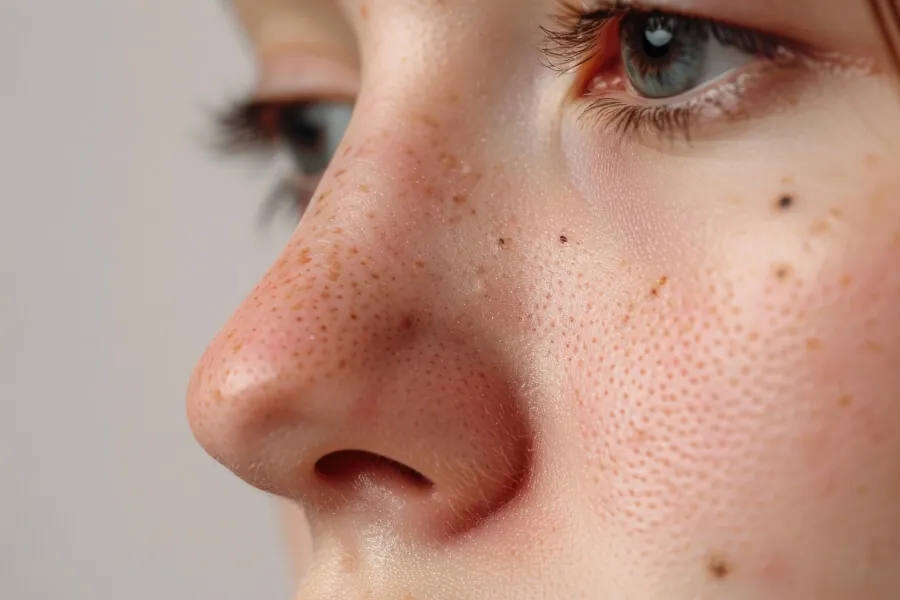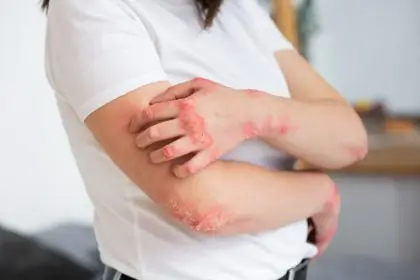The skin barrier, also known as the stratum corneum, is the outermost layer of our skin. It plays an important role in protecting our body from environmental toxins and pathogens, and it also helps retain moisture within our skin. However, there are various factors that can damage this protective shield, leading to numerous skin issues. In this article, we will explore the skin barrier, its importance, causes of damage, symptoms of a damaged skin barrier, and how to repair and heal it!
What is the Skin Barrier?
Well, the skin barrier is the outermost layer of the skin, often described as a brick wall, do you believe? It consists of tough skin cells called corneocytes that are bound together by mortar-like lipids. Inside these skin cells, or “bricks,” you’ll find keratin and natural moisturizers. The lipid layer contains cholesterol, fatty acids, and ceramides. This fantastically thin brick wall is literally keeping us alive!
How to repair skin barrier?
When it comes to caring for your skin’s barrier, prevention is better than cure. So here are some tips to keep yours healthy and minimize damage:
- Use lukewarm water for your skin. Water that is too hot or cold can irritate skin.
- Skip harsh cleansers. Harsh cleansers can strip away the essential moisturizing and nourishing substances that keep your skin barrier healthy.
- Scrub gently. Use a gentle, leave-on exfoliant.
- Use fragrance-free skincare products. Fragrance – including essential oils – makes skin more sensitive and can rob it of the replenishing ingredients it needs to stay healthy.
- Don’t overdo it when using active ingredients like AHA, BHA, retinol, or anti-acne treatments. AHAs, BHAs, retinol – these are all amazing for your skin, but too much of a good thing can be bad. Start slow and find what works for you. Think of it like training your superpowers; you wouldn’t try to lift a building on day one! Apply products with strong ingredients at different times, like using your super strength in the morning and mind control at night. You’ll still get the benefits without overloading your system.
- Sunscreen is your daily shield. Sun exposure is one of the major causes of a damaged skin barrier. Use a sunscreen that is rich in antioxidants and has an SPF of 30 or greater.
Causes of a Damaged Skin Barrier
- Super dry and super humid environments
- Pollutants, allergens, and harsh chemicals can irritate
- Excessive UV rays weaken your skin’s defenses
- Harsh soaps and detergents can strip away natural oils
- Certain skincare ingredients can be too aggressive
- Scrubbing too hard or too often disrupts
- Steroid Stress
- Stress can manifest on your skin
- Genetics
Symptoms of a Damaged Skin Barrier
- Your skin can’t hold onto moisture, leaving it dry
- Itchiness
- Rough patches, discoloration, and uneven texture
- A weakened barrier allows bacteria to party on your face, leading to acne flare-ups
How to Heal the Skin Barrier?
your skin needs the right ingredients to stay strong. Fatty acids, cholesterol, ceramides, and hyaluronic acid are its ultimate power-ups!
These superstars help build a strong and healthy skin barrier, which is like your skin’s personal shield. No matter what your skin’s condition is, giving it these ingredients is always a good call.
- Use long sleeves, pants, and wide-brimmed hats to block UV rays from your skin.
- Moisturize daily. Moisturizers hold water in your skin barrier.
- Use products containing hyaluronic acid, petrolatum, or glycerin.
How Long Does It Take for the Skin Barrier to Heal?
The good news is: a broken skin barrier can be repaired, but it does take a little time and effort for you to make. Depending on the extent of the damage, it can take anywhere from a couple of weeks up to 6 months to get it back to its protective best.
Following these steps will help you maintain a healthy skin barrier, which means you’ll soon see smoother, softer and younger-looking skin.
Conclusion
The skin barrier is a vital part of our skin’s health. It protects us from harmful environmental factors and helps retain moisture. However, various factors can damage this protective shield, leading to numerous skin issues. By understanding the causes and symptoms of a damaged skin barrier, we can take steps to repair and heal it, ensuring our skin remains healthy and radiant.
FAQs
What causes a damaged skin barrier?
A damaged skin barrier can result from various factors such as harsh weather conditions, over-exfoliation, using abrasive skincare products, exposure to environmental pollutants, and underlying skin conditions like eczema or dermatitis.
How do I know if my skin barrier is damaged?
Signs of a compromised skin barrier include persistent dryness, flakiness, redness, sensitivity, itching, and a rough or uneven texture. If you’re experiencing these symptoms, it’s essential to assess your skincare routine and lifestyle habits to identify potential triggers.
Can a damaged skin barrier repair itself naturally?
While the skin has a remarkable ability to regenerate and repair itself to some extent, a severely damaged skin barrier may require external interventions to expedite the healing process. By adopting a skincare routine focused on barrier repair and incorporating nourishing ingredients, you can support and enhance the skin’s natural healing mechanisms.
How long does it take to repair a damaged skin barrier?
The timeline for skin barrier repair can vary depending on the extent of the damage and individual factors such as skin type, age, and overall health. In general, noticeable improvements may be observed within a few weeks of consistent treatment, but complete restoration may take several weeks to months.
What skincare ingredients are effective for repairing a damaged skin barrier?
Ingredients such as ceramides, fatty acids, cholesterol, hyaluronic acid, niacinamide, and antioxidants are beneficial for repairing and strengthening the skin barrier. These components help replenish lipid levels, lock in moisture, reduce inflammation, and protect the skin from external stressors, facilitating the healing process.






